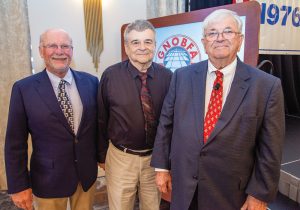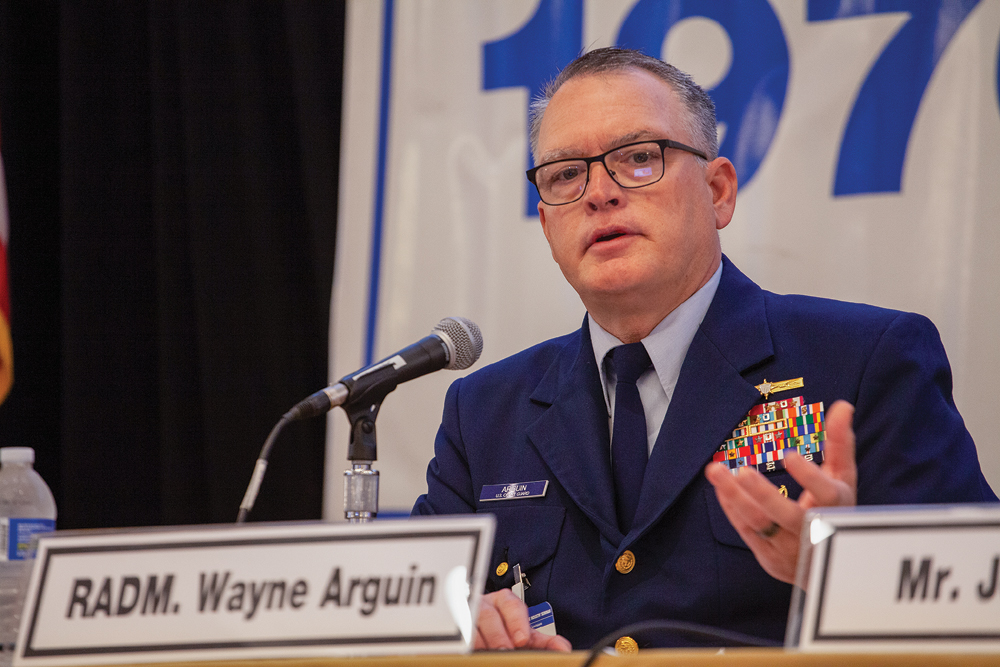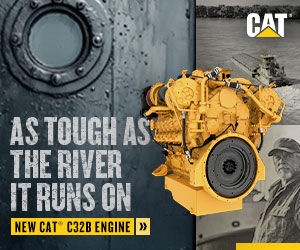The Greater New Orleans Barge Fleeting Association hosted the 39th version of its annual River and Marine Industry Seminar, one of the oldest and most respected maritime law seminars in the country, April 26-28. The event was held at the Intercontinental Hotel in midtown New Orleans.
Attendees included maritime attorneys, marine insurance agents and adjustors, claims managers, fleet owners and operators and anyone with a professional interest in maritime law or the marine industry. Panelists included senior Coast Guard officials, as well as leading attorneys and judges in maritime law and medical and insurance experts.
In his opening remarks, GNOBFA President Karl Gonzales noted that the seminar had to turn people away this year due to its popularity and site restrictions. The seminar sold out its limit of 375 attendees, with 117 of these being first-time attendees, indicating that GNOBFA is attracting new members and laying the foundations for future growth.
Marc Hebert, conference organizer and a partner at Jones Walker, moderated most of the panels. But his father, longtime GNOBFA director Maurice Hebert, made a surprise “Tom Brady” comeback appearance to host a panel, although he announced his retirement from GNOBFA duties last year.
A highlight of this year’s seminar was a brief remark by Greg Derbes, who conceived of the GNOBFA seminar 30 years ago when he was a fleet manager; today he operates an IT consulting firm he founded in Baton Rouge.
Arguin On MTS Challenges

Gonzales introduced keynote speaker Rear Adm. Wayne Arguin, the U.S. Coast Guard’s assistant commandant for prevention policy, after praising his leadership during last year’s low-water events. Marc Hebert noted that during the 2018 high water, Arguin personally inspected levees.
In recent years, Arguin said, most of his time has been spent on the issues of mariner shortages and mental health, as well as more congestion on waterways and the challenges of reducing greenhouse gases in the marine transportation system. As alternative fuels spread and technology becomes more complex, towing companies will increasingly need young people with a new suite of technical skills, he said. While companies have some leeway to specialize in one or another of the new fuel possibilities—liquefied natural gas, ammonia, methanol or electric—the Coast Guard must be knowledgeable about all of them to fulfill its duties.
Arguin mentioned sexual harassment, connecting it with recruitment efforts. The Coast Guard has just released new reporting requirements for instances of sexual or other harassment aboard regulated vessels. “Prevention is better than accountability after the fact,” Arguin said. Ensuring that all mariners feel safe and that nothing distracts them from doing their jobs is a safety issue, he said.
Arguin said the Coast Guard had received 85 recommendations from the Merchant Marine Personnel Advisory Committee (MERPAC) regarding how to streamline recruitment processes.
Shared use of the waterways is another challenge, Arguin said, as wind power becomes more widespread, and wind installations must share space with commercial offshore and water traffic. Automation is being implemented for many types of infrastructure, from bridges to trains, and is being studied for locks and dams. “Without our ports and waterways systems, we would not be the world leader we are today,” Arguin concluded.
Maritime ‘Jeopardy’
The first panel explored the “maritime dictionary of litigation terms”—many of them in Latin—by using a “Jeopardy” type format, with Gonzalez, Savoie and GNOBFA committee member Tommy Grantham acting as “contestants” in the front row.
Andrew Edison, a United States magistrate judge for the Southern District of Texas, hosted a panel with New York maritime attorney James Mercante and Marc Hebert. Edison noted that most judges in Texas who hear maritime cases come to the bench with little or no experience in maritime law. “Federal judges are not dumb—but we can be ignorant. We rely on you [members of the industry] to educate us,” he said, and insisted, “There is no amount of explanation [of maritime issues] that we will find insulting.”
A lively discussion ensued of the differences between a marine investigation conducted by the Coast Guard alone versus one that included the National Transportation Safety Board. Hebert noted that the NTSB has become much more active in marine investigations in recent years. Unlike Coast Guard findings, the findings of an NTSB board are admissible in court as evidence in marine casualty cases—but not the NTSB’s conclusions about an incident.
Hypothetical Spill, Injury Scenario
Many of the panels exploring legal and insurance topics worked from a hypothetical scenario—“hypothet” in legal shorthand—crafted by the GNOBFA leaders, involving oil spills, a hull breach and multiple injuries. One panel moderated by Hebert included Edison and Mercante, a maritime defense attorney with Rubin, Fiorella, Friedman and Mercante LLP. It explored questions such as who is considered a “seaman” under the Jones Act, what is “joint and several liability,” what is “all risk insurance,” and who counts as a “longshoreman.”
Lara DiCristina of Jones Walker and Kristi Post of Blake Jones Law firm examined the issues surrounding pre-existing injuries in personal-injury lawsuits, and under what circumstances a maritime employer can ever deny maintenance and cure payments, which are payments due under maritime law to an injured Jones Act employee regardless of fault.
C. Barrett Rice of Broussard & Williamson and Jason R. Kenny of Staines, Eppling & Kenney LLC discussed some of the “strange and numerous” issues that could arise in a personal injury lawsuit arising out of the scenario, and what issues are or should be presented to the employer when responding to the hypothet. What coverages are invoked and why? What are the various clauses and restrictions in a policy and how do they apply?
Triple Challenges of Sustainability, Technology, Capacity
April 27 opened with a panel on legal ethics and professionalism presided over by Circuit Judge Kurt Engelhardt of the Fifth Circuit, a veteran GNOBFA panelist. It included two other judges, U.S. Magistrate Judge Donna Currault and Justice Ken Wise of the Texas Judicial Branch, as well as Jonathan Sandoz, a senior vice president and general counsel of CGB Enterprises and George Vourvoulias, an attorney with The Maritime Injury Law Firm in New Orleans.
A panel on emerging challenges to the MTS included Arguin; Mike Ellis, CEO of American Commercial Barge Line; and Jon Macklem, vice president and legal counsel of the Cooper Group. The “triple challenge,” Arguin said, involved increasing MTS capacity; meeting public demand for sustainable stewardship; and managing increasingly complex technologies to improve efficiency and profitability. Marc Hebert noted that a company called Saildrone is already operating autonomous solar-powered sailing vessels controlled by artificial intelligence to map the oceans and provide data. The Coast Guard is studying rules of the road for autonomous vessels.
Ellis pointed out that even before technology improvements are brought up, “We are so much more efficient than before” in operations. “We are moving cargo more efficiently, and always looking for that sweet spot in vessel-building decision trees.” He reminded attendees that efficiency always has to include cost efficiency. “Stakeholders always want to know what you are doing.”
A doctors’ panel featuring hand specialist Dr. Barton Wax of the Jefferson Orthopedic Clinic and cardiologist Dr. R. Dean Yount of Ochsner Health discussed how to deal with the injuries in the scenario.
A panel that discussed charter agreements featured Bridge Carbary, in-house counsel for Upper River Services and Chris Ulfers of Jones Walker as “defense attorney.”
Seminar organizers stressed the importance of attendees filling out the comment sheets, which help them as they immediately go to work organizing next year’s seminar.




